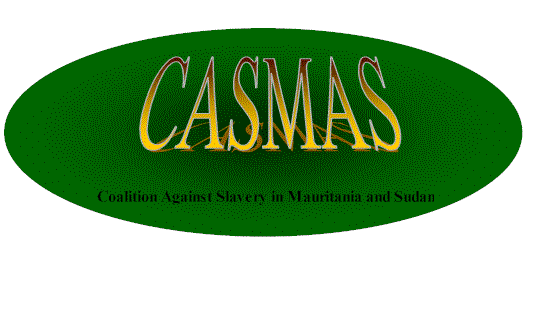 | Where is Mauritania? |
Mauritania is southwest of Algeria, south of the Western
Sahara, west of Mali, and north of Senegal. It has a 700-kilometer coastline on the
Atlantic Ocean. The northern two-thirds of the country is part of the Sahara desert.
 | What critical problems are facing Mauritanians? |
Slavery, racial division, human rights abuses and
environmental degradation.
 | What is Mauritania's economic base? |
Mauritania's economy is based on agriculture, livestock,
fishing, and mining. The country has huge mineral potential in copper, phosphates,
and petroleum. Deposits of tungsten and uranium have also been identified.
Iron ore reserves are estimated at 200 million tons with a high ferrous content of 65
percent to 70 percent.
 | What is Mauritania's colonial history? |
Historically, Mauritania was inhabited by Black Africans.
The region was the setting for advanced West African civilizations. An influx
of Arabs from the north during the thirteenth, fourteenth, and fifteenth centuries forced
settled Black communities south toward the Senegal River. In the 1850s the French
encroachment from the south isolated Black Mauritanians between the French and the Arabs
in the north.
 | Describe the current crisis in Mauritania. |
The continuing crisis in independent Mauritania stems from
its arbitrary creation by colonial France when France allowed Mauritania to become
independent in 1960. Since then, it has been plagued by violent ethnic strife, the
continuing practice of slavery and civilian/military rule, compounded by ecological
degradation resulting from prolonged drought and desertification.
 | Does slavery exist in Mauritania in 1998? |
Yes! Slavery has persisted in 1998. In ancient times
slavery was common in Mauritania. It became part of armed conflict between ethnic or
political groups. Slavery continued among these populations in Mauritania through
the eighth century, coming under Islamic authority. From this point forward, only
Black Africans have been enslaved in Mauritania.
 | Has slavery ever been abolished in Mauritania? |
Slavery was first abolished in Mauritania by its
colonizer, France, in 1905. The second abolition was implied in the new constitutin
of Mauritania after France granted the country's independence in 1961. The third
occurred when Mauritania joined the United Nations in October 1961. The fourth time
abolition of slavery was proclaimed was in 1981 by the Military Committee of National
Salvation. Article Two of the 1981 ordinance granted compensation to slave holders.
However, although they were granted compensation, the language was so ambiguous
that it was unclear where they money was to come from, and there was no provision for
enforcement. That situation has lasted until today. Most slave masters
continue to hold slaves, arguing that they must be compensated before they free their
slaves.
 | Are there recent verified accounts of slavery in
Mauritania? |
In 1982, the London-based Anti-Slavery Society estimated
that there were 400,000 slaves still held by Arab Mauritanians. In June 1994, the
American Anti-Slavery Group and Amnesty International claimed that 90,000 Blacks still
live as "the property" of slaveholders. They also reported that 300,000
freed slaves continued to serve their former masters because of psychological or economic
dependence. In February 1996, an AFSC staffer visiting Mauritania videotaped
recently freed slaves and heard anti-slavery leader Bobacar Messaoud estimate that nearly
half the population continues to be either enslaved or in slave-like relationships.
 | Describe the condition of women. |
Traditional forms of mistreatment of women continue, both
in urban and rural areas. It consists of forced feeding of adolescent girls (gavage)
and female genital mutilation. In gavage, brutal force is used to fatten young women
so they will be more acceptable to men. Women in Mauritania usually do not seek
legal redress, but rely on family and ethnic group members to intervene.
 | Are children's' rights respected in Mauritania? |
The government relies on foreign donors for immunization
for diseases. It also does not require attendance at school. Nor does the
government enforce existing child labor laws, and children perform much of the families'
needed labor. There are reports of parents, in exchange for money, sending their
children abroad to work. |
